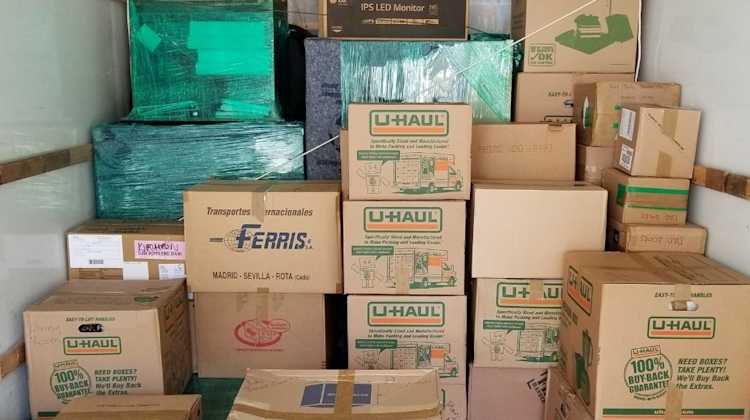PCS Taxes Explained
by Lizann Lightfoot - April 6th, 2022
Our guest is Chrissy Laycock, an Army Brat, Air Force spouse, and proud Army mom! She is a full-time accountant and lives in Virginia.
Military PCS taxes can be complicated. Can PCS expenses be claimed on taxes?
Yes, some but not all travel PCS expenses can be claimed on your taxes. It depends on the location and the type of move, so you have to know what is allowed. If you are doing a PPM (personally procured move, formerly known as a DITY move), most of your expenses are reimbursed, and that income is taxable.
Bottom line: If the military reimburses you, you cannot claim this as a deduction on your taxes.
As a family goes through a PCS, what receipts, documentation, or other files should a person keep that they might need come tax season?
Receipts, receipts, receipts! If you’re doing it yourself (a PPM), keep all receipts: weight tickets, gas, any vehicle maintenance you did to prep for the move. Any prep work for the members of the household such as immunizations can also be claimed. What the military covers may not be the same as the PCS expenses you can claim on your taxes. Anyone you can claim as dependents can be claimed on your taxes, even if they aren’t DEERS dependents.
You’ll also want to refer to the orders, IRS Publication 3 (Armed Forces Tax Guide), form 3903 (Moving Expenses), 1040 Schedule 1 (adjustments to income), DD1351-2 Relocation Income Tax Allowance (RITA), W-2, Travel W-2 for documentation about taxes.
What PCS expenses can be claimed on taxes?
You can only claim what the military does not reimburse you for: Non-reimbursed “reasonable” travel expenses related to the move for any member of the household, including pets.
Temporary Dislocation Allowance: the military covers up to ten days total, but if you are out of your house longer than that for any reason (buying, selling, cleaning, waiting on base housing, etc.) you can claim the additional expenses for the extra days outside of the ones the military reimbursed you for.
Storage and insurance: 30 consecutive days after the day the goods are moved from your former home and before they are delivered to your new home. The military doesn’t reimburse insurance, so you can claim that. Remember not to cancel your insurance policy when you move! Always wait until you arrive at the new location to adjust or roll over your claim.
Travel: lodging (within limitations), airfare or mile reimbursement and expense (actual costs of gas and oil or a rate of 17 cents a mile), plus parking and tolls. You can’t claim a Disney vacation for a PCS move reimbursement. You have to move within reason from Point A to Point B.
Foreign moves have increased limitations for lodging, travel, and storage.
The military is not the IRS, so even though some of the rules overlap, remember that some of the rules are different, so it’s important to research the rules specific to your taxes and moving situation.
If you choose to stop by another location and pick up household goods from a 3rd location (family member’s house, geo-bach location, etc.), the military won’t reimburse that pickup, so it can be deducted on your taxes.
If living in on-base housing and a full cleaning is required, you may be able to claim the expense of hiring a cleaning service since the military requires but does not reimburse this expense.
You can learn more about what PCS expenses will and won’t be taxed here.
What PCS expenses cannot be claimed on taxes?
Meals, any already reimbursed PCS expenses, non-reasonable travel expenses, expenses for someone outside your household, or goods acquired along the way to your new location.
Reimbursements received that are greater than actual expenses incurred must be claimed as income on line 1 of form 1040.
The military does not reimburse shipping cars CONUS, but they do cover some car shipments for OCONUS locations. If you moved OCONUS and the military covered or reimbursed the car shipment, then you cannot deduct it on your taxes.
You cannot claim the cost of replacing pantry items and other items that you throw out before the move.
You can’t claim expenses that are unrelated to the actual move: home repairs before moving out and selling, security deposits and first month’s rent at the new location, etc.
What PCS payments will a service member receive a W-2 for?
Reimbursement for a non-personally procured move (PPM, formerly DITY) will show as income on your normal W-2 and are subject to taxes. Travel reimbursements for a PPM move don’t appear on your W-2, you will receive an additional document called a W-2T or a Travel W-2. Be warned that this may come in the mail later than your original W-2, so wait to file taxes until you receive the W-2T, which is supposed to be postmarked by January 31st.
Check your branch finance website to see if your W-2T is listed there. Your travel vouchers were originally filed through your finance office. You can also contact DFAS because they issue your W-2 and other tax information.
What year do I include my PCS in my taxes? Is it the same as the year I move?
If you moved in 2020 and received the income in 2021, you usually would not include it until you pay your 2021 taxes (in 2022.) However, it does depend on how you file your taxes. Most people use the cash basis, but if you use an accrual basis of accounting, you may file it earlier.
The dates affect more people who move later in the year and may receive some portion of payment in one year, and the rest of the DITY/PPM payment in 2021. In that case, file the income in the year where you received it, in two separate years.
Many people claim at least a partial PPM (DITY) that is taxed when paid to them. Are there ways to reduce the amount of PCS taxes?
Sadly, no. The current rates for PCS tax reimbursements are 22% Federal, 6.2 % SS tax, and 1.45% Medicare tax. State and local tax is not taken out prior to you receiving the reimbursement so check with your tax preparer to see if you are subject to state and local tax as it varies by location. However, if your expenses exceed the amount of your reimbursement, that amount can be used to reduce your tax liability.
Also, you can possibly be refunded all of the PCS taxes paid, for all travel reimbursements, in the following tax year by filing for a RITA (Relocation Income Tax Allowance) reimbursement. You can apply for this the year after you move, and if you are accepted, you will receive the entire amount of your state and local taxed quantity back. This is generally for civilian government employees, but can apply to service members.
What is the biggest piece of advice you can give to a family embarking on their PCS or preparing their taxes?
Prepare, Prepare, Prepare! Research early and often. Learn as much as you can and consult tax and finance professionals when in doubt or for clarification. There is no such thing as being too prepared or having too much information.
Your specific locations and your family situations impact your taxes. You are taxed federally, but not typically for state and local. When in doubt, ask. It may be worth it to spend the money to hire a tax professional so you have less stress and no confusion about the laws.







